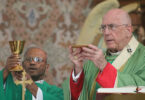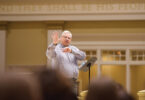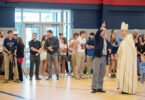
Archbishop Joseph F. Naumann takes part in a listening session at the St. Lawrence Catholic Campus Center on April 19. Dioceses throughout the world have been encouraged by the Vatican to conduct listening sessions in preparation for the October 2018 Synod of Bishops on “Young people, faith and vocational discernment” and report back their findings. LEAVEN PHOTO BY JAY SOLDNER
by Moira Cullings
moira.cullings@theleaven.org
KANSAS CITY, Kan. — Are you a young adult disconnected from your Catholic faith?
Do you feel upset with the church or detached from its teachings?
Pope Francis wants to hear from you.
And the Catholic Church is listening.
In preparation for the October 2018 Synod of Bishops on “Young people, faith and vocational discernment,” the Vatican released a series of questions addressed specifically to young adults.
Dioceses throughout the world have been encouraged to conduct listening sessions using those questions to gather feedback from that demographic from both within and outside the church.
Diocesan leaders will summarize the responses into reports, which will eventually be sent to the Vatican.
The Archdiocese of Kansas City in Kansas hosted two sessions — the first on April 19 at St. Lawrence Catholic Campus Center at the University of Kansas in Lawrence and the second on April 27 at St. Agnes Church in Roeland Park with St. Paul’s Outreach.
Archbishop Joseph F. Naumann and members of the archdiocesan evangelization division sat in to hear what young people in our archdiocese had to say.
Do you feel the Catholic Church understands your life?
Most of the young people in attendance had a similar take on this question.
“I don’t know if I would say the church overall understands what each individual person is going through,” said one young man.
Because everyone is unique, it’s difficult for the church to recognize the struggles and needs of young people, he continued.
Many agreed that priests and parishioners should work on reaching out to young people to learn more about their lives and better understand their situations.
But one of the ways the church does do a good job of listening, said participants at both sessions, is through its mercy.
“No matter what you’re going through or what you’ve done, the church is always inviting you back in,” said one woman.
“I’d also answer that there’s a lack of understanding of that mercy and a lack of communication toward people our age to fully understand and accept the love the church teaches,” she added.
What are the main challenges young people have in the U.S.?
Some of the biggest problems this generation faces revolve around navigating their place in a society that is constantly changing — and doing so while maintaining a strong faith.
Drug and alcohol abuse are common issues in the United States, yet they are issues that most of the participants feel the church does little to address.
Another dilemma is the pressures that come from social media.
One woman argued that the digital world often leaves people feeling bored and isolated.
“Being overly connected, but not really having any intimacy in relationship [is a problem],” she said. It causes her to ask, “Does anyone really know me?”
Feeling lonely and on the outskirts of the church is common among this generation — especially after college.
“You’re in high school or college and then there’s young married couples,” one woman said. “But where is that in between?”
Participants agreed the church does a lot to guide high school and college students in the faith through youth groups and Bible studies, but community is much harder to find in the real world.
What groups within and outside of the church have the most success?
St. Paul’s Outreach, Credo in Topeka, FOCUS and Catholic Challenge Sports are the groups that participants named most frequently as successful outreaches to their generation.
Participants also agreed that small group Bible studies and Theology on Tap events are effective ways to reach their generation.
The opportunity for spiritual direction and retreats is key and both groups of participants said they should be more readily available.
What do young people want from the church?
Most of the young adults want a relationship with the church.
“In Catholic education, [we should] facilitate an encounter with Christ before we try to teach the rules,” one woman said.
Many in attendance also desire acceptance. They don’t want the church to change its teachings, but to be more accepting of all individuals.
One of the men discussed how his generation desires experiences and adventure, encouraging the church to promote the faith as an encounter with Christ.
“I would challenge the church to present itself not didactically but experientially — as an experience of life,” he said.
It’s also important to this generation that parishes are more welcoming and make a greater effort to include them in activities and events.
“At the parish level, young adults are almost like this forgotten middle child,” said one young woman. “We’re the future of the church, and we’re the ones that are not being invested in.”
Ultimately, many within this generation desire one thing from the church.
“We want to be wanted,” said one young man.
“The deepest desire of [many] young people,” he continued, “is to be fully Catholic and fully alive.
“We want to be invited into the Catholic Church. We want to be noticed.”






